Infographics transform complex data into engaging, easy-to-understand visuals. They captivate audiences and boost marketing efforts. In 2025, 65% of marketers incorporate infographics into their content strategies.
Businesses using them gain 178% more inbound links and achieve 650% higher engagement compared to text-only posts. Consumers retain 61% of information presented through infographics, and visuals process 60,000 times faster than plain text.
These numbers highlight why 84% of companies view infographics as a cornerstone of digital marketing.
This article explores the latest infographic statistics for 2025, covering usage, audience interaction, social media impact, and responsive design.
Written in clear, simple English, it provides full sentences and detailed tables to summarize key data. We aim to help readers—marketers, bloggers, and business owners—understand how infographics drive results.
Additionally, we include fresh insights from Quora and Reddit, addressing user questions about AI tools and animated infographics. These trends ensure you stay ahead in 2025.
Infographics increase website traffic by 12%. Around 33% of marketers prioritize them as their top visual content. They are 30 times more likely to be read than text articles.
People retain 65% of information when paired with relevant visuals. Google displays image results for 27.9% of searches, with 3% of clicks going to image blocks.
Posts with visuals earn 650% more engagement. These Infographics Statistics are vital for capturing attention in a fast-paced digital world.
Why Infographics Matter in 2026
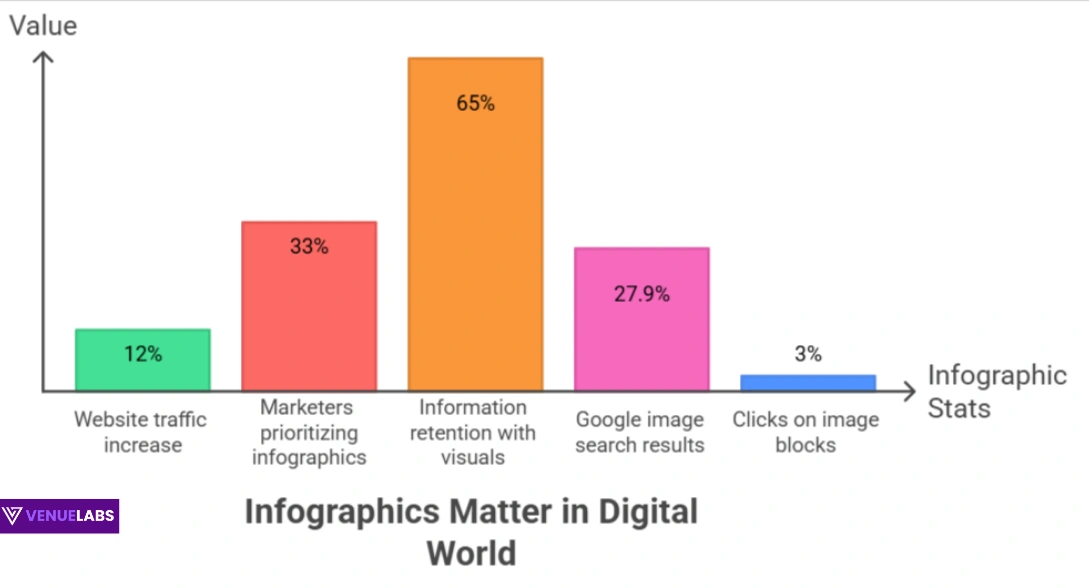
Infographics remain a powerful tool in 2025. They boost website traffic by up to 12%. Approximately 33% of marketers choose infographics as their primary visual content.
Readers engage with infographics 30 times more than with written articles. Visuals help people retain 65% of information, compared to just 10% for text alone.
Google includes image results in 27.9% of searches, and nearly 3% of clicks target these image blocks. Social media posts with images see 650% higher engagement.
On Reddit’s Infographics, users discuss 2025 trends like animated infographics. A post on digital marketing highlights that 88% of marketers find motion visuals increase brand visibility.
Animated infographics explain processes dynamically, encouraging longer viewer engagement and more shares. Quora users ask, “Which AI tools create the best infographics?”
Popular answers include Canva AI and Piktochart, which simplify design for beginners. These tools help you create professional visuals quickly, saving time and boosting impact.
| Key Infographic Relevance Stats for 2025 | Value | How You Benefit |
| Website traffic increase | Up to 12% | Attracts more visitors to your site |
| Marketers prioritizing infographics | 33% | Saves time in content creation |
| Readability compared to articles | 30x | Keeps readers engaged longer |
| Information retention with visuals | 65% | Strengthens audience recall |
| Google image search results | 27.9% | Enhances SEO rankings |
| Clicks on image blocks | 3% | Drives direct traffic |
| Engagement on posts with images | 650% | Grows social media followers |
Sources: Forbes
To leverage these stats, start with a simple infographic about your niche. Share it on LinkedIn or Instagram. Track the increase in traffic and engagement. This approach maximizes visibility and builds your audience.
Infographic Usage in 2026: Marketer and Consumer Insights
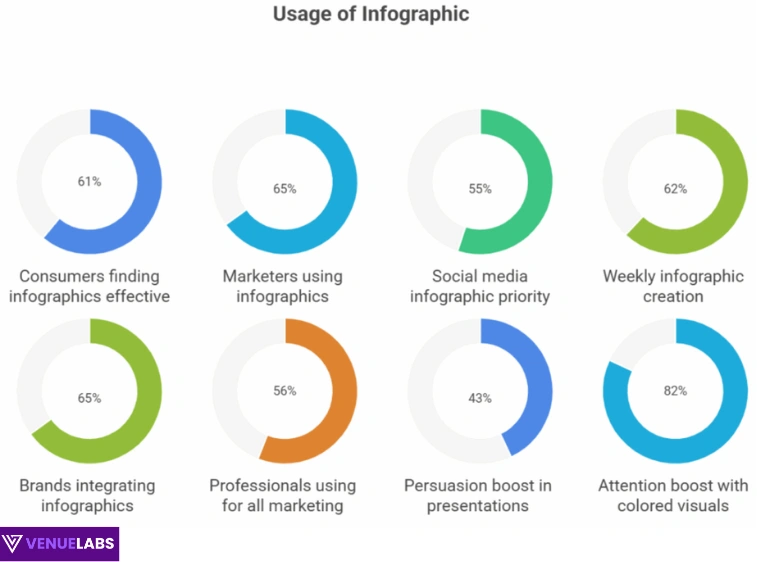
Marketers heavily rely on infographics in 2025. A striking 61% of consumers find infographics the most effective way to retain information. Meanwhile, 65% of marketers integrate infographics into their content strategies.
Visual content processes 60,000 times faster than text, making it ideal for quick communication. Social media infographics are the top choice for 55% of marketers. Content creators produce infographics twice a week in 62% of cases. Instagram and LinkedIn dominate as the primary platforms for sharing.
Brands incorporate infographics in 65% of their content marketing plans. Professionals use infographics for all marketing purposes in 56% of cases.
Presentations with visual aids like infographics persuade audiences 43% more effectively. Colored infographics increase attention and comprehension by 82%.
In the United States, 39.7% of marketers use online tools to create infographics. An impressive 84% of companies consider infographics a valuable tool. Posts with visuals achieve 650% higher engagement. Businesses using infographics find needed information 28% more easily.
Quora users frequently ask about infographic creation costs. Basic designs range from $100 to $500, while professional ones may cost $1,000 or more.
Free AI tools like Canva help you start without upfront costs, making infographics accessible to all.
| Infographic Usage Statistics for 2025 | Percentage/Value | Practical Application |
| Consumers finding infographics effective | 61% | Simplify product explanations |
| Marketers using infographics | 65% | Plan consistent visual content |
| Social media infographic priority | 55% | Post daily on Instagram |
| Weekly infographic creation | 62% | Build a content library |
| Top platforms: Instagram & LinkedIn | N/A | Target professionals on LinkedIn |
| Brands integrating infographics | 65% | Use brand colors for consistency |
| Professionals using for all marketing | 56% | Pitch ideas to clients |
| Persuasion boost in presentations | 43% | Win more pitches |
| Attention boost with colored visuals | 82% | Use vibrant designs |
| U.S. marketers using online tools | 39.7% | Choose Canva for ease |
| Companies valuing infographics | 84% | Justify visual budgets |
| Engagement increase with visuals | 650% | Monitor shares weekly |
To apply these insights, create one infographic weekly. Use tools like Venngage or Canva to streamline the process. Measure engagement metrics like shares and clicks. Adjust designs based on what resonates with your audience.
Venngage’s 2025 report notes a rise in interactive infographics. These include clickable elements like quizzes, boosting engagement by 200%. You can create interactive designs to keep viewers on your page longer.
How Audiences Engage with Infographics
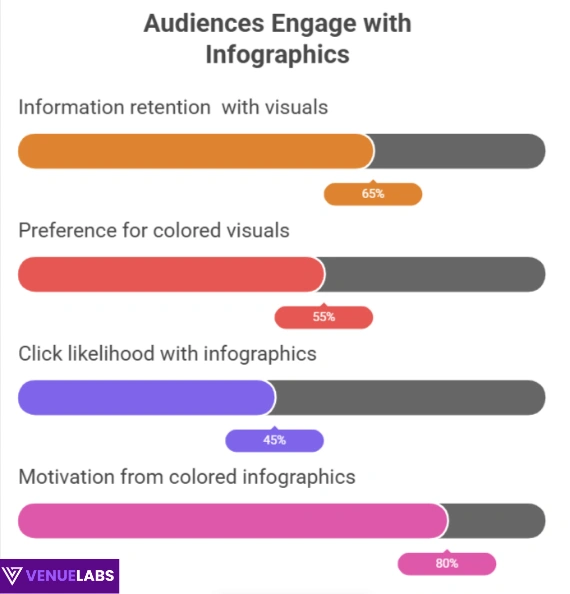
Audiences interact strongly with infographics. They retain 65% of information when paired with relevant visuals. A majority, 55%, prefer colored infographics over black-and-white ones.
Nearly half of online visitors click links featuring infographics, making them 45% more likely to engage. Visuals prompt users to initiate payments 30 times more often.
Colored infographics motivate action in 80% of cases. People receiving health data through infographics understand their conditions 2.84 times better. Half of users focus more on content with images.
Research shows graphical representations convince audiences 43% more effectively. A significant 67% of users value brief yet detailed visuals over text.
Additionally, 70% feel more connected to brands through visual campaigns. HubSpot reports infographics increase retention by 78%, making them ideal for driving clicks and conversions.
On Reddit’s Infographics, a drunk driving stats infographic sparked 15+ comments quickly. Emotional visuals like these drive interaction. You can create infographics for social causes to boost engagement.
| Audience Interaction Statistics for 2025 | Impact | How to Apply |
| Information retention with visuals | 65% | Pair blogs with infographics |
| Preference for colored visuals | 55% | Use vibrant color schemes |
| Click likelihood with infographics | 45% | Place strategic CTAs |
| Payment initiation with visuals | 30x | Use in e-commerce funnels |
| Motivation from colored infographics | 80% | Highlight key stats |
| Health data comprehension | 2.84x | Simplify complex info |
| Focus on content with images | 50% | Break up text-heavy pages |
| Conviction from graphical representations | 43% | Support arguments visually |
| Value of brief, detailed visuals | 67% | Keep designs concise |
| Brand connection through visuals | 70% | Build a visual story series |
Sources: Infographic World
To maximize interaction, test A/B versions of your infographics. Compare a colorful design against a grayscale one. Track click-through rates to refine your approach.
General Infographic Statistics: Driving Retention and Accessibility
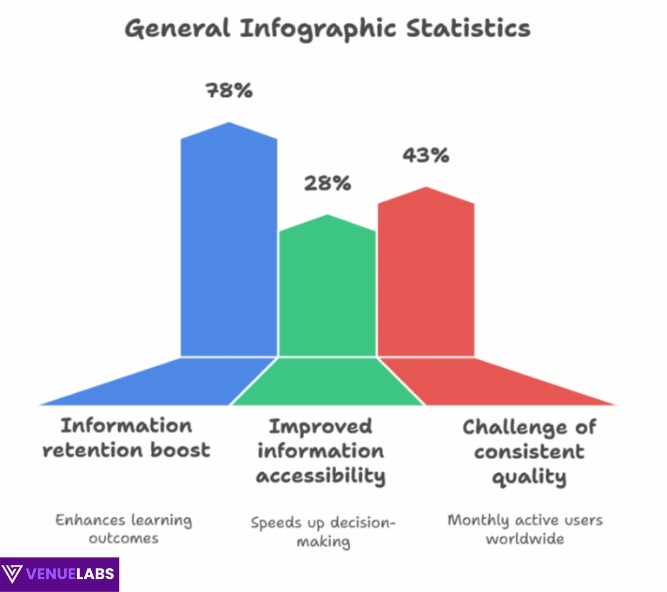
Infographics deliver measurable results. They increase information retention by 78%. They process 60 times faster than plain text. Businesses using infographics find information 28% more efficiently.
Over 65% of businesses allocate more than 10% of their budgets to visual content. However, 43% of marketers struggle to create consistent, high-quality visuals.
Approximately 37% of users click the first link in an infographic. Blogs and articles with infographics gain 178% more external links, boosting SEO.
Venngage’s 2025 insights show a 15% budget increase for AI-assisted visual content. This trend makes it easier for you to produce professional infographics affordably.
| General Infographic Statistics for 2025 | Figure | Benefit for You |
| Information retention boost | 78% | Enhances learning outcomes |
| Processing speed compared to text | 60x | Suits short attention spans |
| Improved information accessibility | 28% | Speeds up decision-making |
| Budget allocation to visuals | >10% in 65% of businesses | Justifies investment |
| Challenge of consistent quality | 43% | Use templates for ease |
| Clicks on first infographic link | 37% | Optimize top CTAs |
| Increase in inbound links | 178% | Boosts SEO rankings |
Social Media Infographics: Amplifying Reach
Infographics shine on social media. They are shared three times more than other content types. Likes and shares increase threefold, leading to 94% more views.
A whopping 70% of social media users prefer learning through infographics. Facebook posts with images double engagement rates. Tweets with visuals are 150% more likely to be shared.
Additionally, 74% of marketers prioritize photos in social posts. Shrinking attention spans make infographics more popular than ever.
For optimal performance, use these ideal infographic sizes:
- Facebook: 1200×628 pixels for shared posts, 1080×1920 pixels for stories.
- Instagram: 1080×1080 pixels for square posts, 1080×566 pixels for horizontal, 1080×1350 pixels for vertical, 1080×1920 pixels for stories.
- Pinterest: 600×900 pixels.
- LinkedIn: 1104×736 pixels.
- Snapchat: 1080×1920 pixels.
- Twitter: 1200×675 pixels for images or GIFs.
| Social Media Infographic Sizes for 2025 | Dimensions | Tip for Success |
| Facebook Shared Post | 1200×628 px | Use for link previews |
| Facebook Stories | 1080×1920 px | Add interactive polls |
| Instagram Square | 1080×1080 px | Ideal for feed posts |
| Instagram Horizontal | 1080×566 px | Use for landscape stories |
| Instagram Vertical | 1080×1350 px | Focus on portrait visuals |
| Instagram Stories | 1080×1920 px | Include swipe-up links |
| 600×900 px | Create tall, shareable pins | |
| 1104×736 px | Share professional insights | |
| Snapchat | 1080×1920 px | Design for quick views |
| 1200×675 px | Use GIFs for motion |
Types of Infographics: Choosing the Right Format
Infographics come in nine main types, each suited for specific purposes:
- Process Infographics: Outline steps for tasks or workflows.
- Statistical Infographics: Highlight key data or metrics.
- Informational Infographics: Provide overviews of topics.
- Timeline Infographics: Show historical events or project milestones.
- Geographic Infographics: Map locations or regional data.
- Comparison Infographics: Contrast products, services, or ideas.
- Hierarchical Infographics: Display structures like org charts.
- List Infographics: Present tips or rankings.
- Resume Infographics: Showcase skills for job applications.
Quora users in 2025 ask about animated timeline infographics for storytelling. These are trending for their ability to engage viewers dynamically. Choose a type based on your goal—use statistical infographics for data-heavy reports or list infographics for quick tips.
| Infographic Types for 2025 | Best Use Case | Example Application |
| Process | Step-by-step guides | How-to tutorials |
| Statistical | Data highlights | Sales performance reports |
| Informational | Topic summaries | Industry introductions |
| Timeline | Historical events | Product launch histories |
| Geographic | Location data | Market expansion maps |
| Comparison | Option analysis | Product vs. competitor |
| Hierarchical | Organizational structures | Company org charts |
| List | Tips or rankings | Top 10 strategies |
| Resume | Skill showcases | Job application visuals |
Start with a list infographic for simplicity. Its shareability makes it ideal for social media.
Responsive Infographics: Optimizing for Mobile
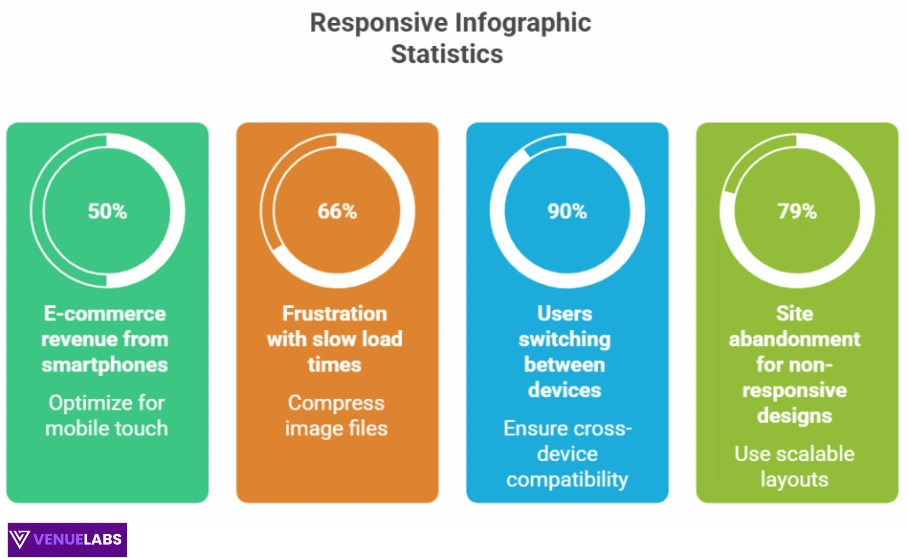
Mobile devices dominate in 2025. Smartphones account for 50% of e-commerce revenue. Responsive infographics adapt to various screen sizes, enhancing user experience.
A significant 66% of smartphone users are frustrated by slow-loading visuals. Over 250 screen sizes exist globally. More than 6 billion people use smartphones, a number that continues to grow.
Additionally, 90% of users switch between devices, and 79% abandon non-responsive sites. Around 80% of consumers shop regularly via mobile.
Forbes emphasizes mobile-first design. Responsive infographics ensure fast loading and thumb-friendly navigation, reducing bounce rates.
| Responsive Infographic Statistics for 2025 | Value | Actionable Step |
| E-commerce revenue from smartphones | 50% | Optimize for mobile touch |
| Frustration with slow load times | 66% | Compress image files |
| Variety of screen sizes | 250 | Test across devices |
| Global smartphone users | 6 billion | Prioritize vertical formats |
| Users switching between devices | 90% | Ensure cross-device compatibility |
| Site abandonment for non-responsive designs | 79% | Use scalable layouts |
| Regular mobile shoppers | 80% | Design thumb-friendly CTAs |
To optimize, test your infographics on multiple devices. Compress files to improve load times. This approach keeps mobile users engaged and boosts conversions.
2026 Trends: AI, Animation, and Accessibility
Quora and Reddit reveal cutting-edge infographic trends for 2025. On Quora, users ask, “What are the best AI tools for infographics?” Canva AI and Piktochart top the list.
These tools generate designs from text inputs, saving 50% of creation time. Free tiers are available, with premium plans starting at $10 monthly.
Reddit’s r/Infographics highlights animated infographics. A 2025 digital marketing post notes 88% of marketers see motion visuals as key to standing out.
Venngage predicts interactive storytelling, like clickable infographics, will double time spent on pages. Bold, simple designs using clean lines and Gestalt principles gain traction. Hand-drawn styles add a personal touch, while 3D visuals and brutalist typography modernize aesthetics.
Accessibility is critical. The World Economic Forum’s 2025 report emphasizes inclusive design. Infographics with alt text and high-contrast colors reach 20% more viewers. You can create visuals on green transitions or skills gaps to tap into global trends.
| Emerging Infographic Trends for 2025 | Description | Your Benefit |
| AI-Generated Infographics | Auto-design from text | Saves 50% creation time |
| Animated Infographics | GIFs and videos | 88% better brand differentiation |
| Interactive Storytelling | Clickable elements | Doubles time on page |
| Bold, Simple Designs | Clean lines, Gestalt principles | Improves comprehension |
| Hand-Drawn Styles | Analog, personal feel | Builds emotional connections |
| 3D and Brutalist Typography | Depth and raw fonts | Appeals to modern audiences |
| Accessibility Features | Alt text, high contrast | Reaches 20% more viewers |
FAQs About Infographics Statistics
1. Why are infographics so effective in 2025?
Infographics grab attention because visuals process 60,000 times faster than text. They drive 650% higher engagement on social media and increase website traffic by 12%. With 65% of marketers using them, infographics simplify data, making it easier for audiences to retain 78% of information.
2. How can I create infographics without design experience?
Use AI tools like Canva AI or Piktochart, which generate visuals from text inputs. Select a template, add your data, and export in minutes. Quora users suggest creating one weekly to build skills. This approach boosts engagement threefold on platforms like Instagram.
3. Why is mobile optimization crucial for infographics?
Smartphones drive 50% of e-commerce revenue, and 79% of users abandon non-responsive sites. Responsive infographics adapt to 250+ screen sizes, reducing frustration for 66% of users. Optimize for mobile to retain 80% of mobile shoppers and improve conversions.
4. Do animated infographics improve marketing results?
Yes, animated infographics increase brand visibility for 88% of marketers, per Reddit trends. They boost shares by 150% on Twitter and keep viewers engaged longer. Use them for processes or stories to create memorable, shareable content in 2025.
5. What ROI can I expect from infographics?
Infographics deliver 178% more inbound links and 28% better information access. With 84% of companies valuing them, you see 650% higher engagement. Invest 10% of your budget in visuals to drive traffic, leads, and SEO rankings effectively.
Also Read:
- Voice Search Statistics
- Microsoft Teams Statistics
- Facebook Statistics
- YouTube Statistics
- WordPress Statistics
Conclusion
Infographics simplify complex ideas, making them ideal for explaining market trends or product features. They boost SEO, with 178% more inbound links improving search rankings.
Allocate 10% of your budget to visuals for high ROI. Engagement soars 650%, driving leads and conversions. Track metrics like views, shares, and clicks to measure success.
Start with a free tool like Canva. Create one infographic and share it on social media. Monitor results and scale up. Infographics build trust, convincing audiences 43% more effectively. They foster community through social shares.
Challenges exist—43% of marketers struggle with quality. Use templates and AI to overcome this. For email marketing, infographics enhance automated campaigns, which generate 320% more revenue. Focus on visuals to make emails stand out.
